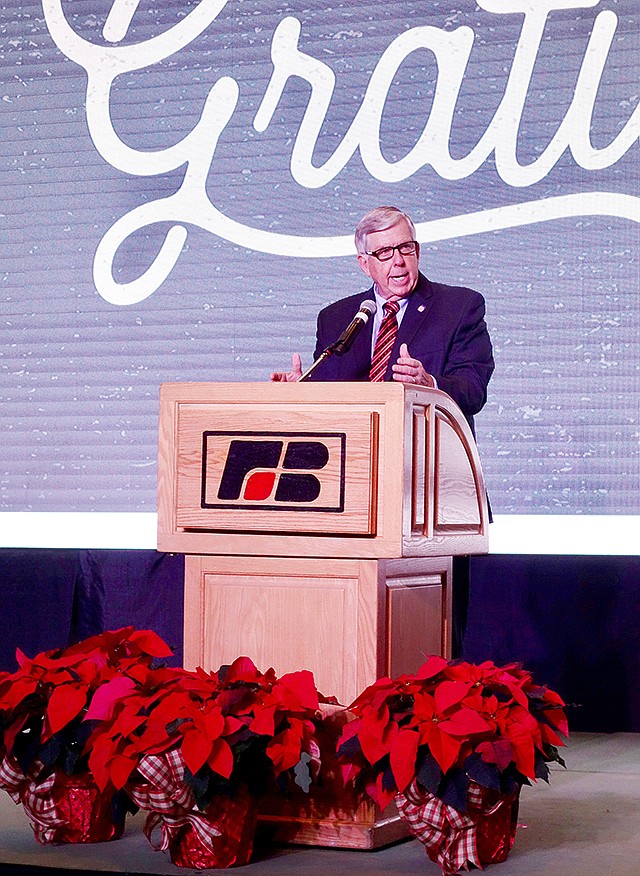OSAGE BEACH, Mo. - As farmers gathered at the 2018 Missouri Farm Bureau annual meeting, a cautious optimism hung in the air.
Republican Gov. Mike Parson, U.S. Sen. Roy Blunt and U.S. Sen.-elect Josh Hawley all have the backing of Farm Bureau and pledged to continue working for the state's farmers Monday morning. Still, over the past year, Missouri farmers weathered a crippling drought and trade disputes that ground exports of soybeans and other crops to a halt.
"You're getting ready to spend hundreds of dollars an acre putting in a crop and you have to have hope you're going to have both good yields and profitable prices," Missouri Farm Bureau President Blake Hurst told the News Tribune.
As trade talks progress, farmers are cautiously optimistic that markets will reopen when a new growing season starts in the spring, Hurst said. Parson, Blunt and Hawley spoke at the meeting Monday morning at the Tan-Tara Resort.
The meeting draws hundreds of farmers from across the state every year.
In June, trade tensions ratcheted up when the U.S. placed tariffs on $50 billion worth of Chinese goods that were subject to a 25 percent tariff. China struck back when it imposed a 25 percent tariff on U.S. products including soybeans, automobiles and seafood.
The trade battle took another turn in September when the U.S. slapped tariffs on another $200 billion worth of Chinese goods. President Donald Trump also threatened to impose an additional $267 billion in tariffs on Chinese goods, which would cover all Chinese goods imported by the U.S., if China took retaliatory action. China retaliated by imposing tariffs on another $60 billion worth of U.S. goods, but the U.S. never fully implemented the third round of tariffs.
Before the trade war started, China imported 25 percent of all U.S. soybeans grown, or approximately $14 billion worth of U.S. soybeans, according to the American Soybean Association. Soybean exports made up about 23 percent of Missouri commodities exports and had a value of $2 billion in 2016, according to the Missouri Department of Agriculture.
From Sept. 1 through mid-October, China's 28 percent tariff on U.S. soybeans caused Chinese imports of American soybeans to drop by 97 percent from 239 million bushels after the same period in 2017 to just 7.5 million bushels in 2018, according to the American Farm Bureau Federation.
This weekend, the sides called a momentary truce when Trump and Chinese President Xi Jinping agreed to give the sides 90 days to negotiate "lingering disagreements on technology transfer, intellectual property and agriculture" and that the U.S. would not impose additional tariffs during that time, according to a White House news release from the meeting at the G-20 summit in Argentina. China agreed to purchase a substantial amount of agricultural and energy products in exchange.
Parson told reporters before he spoke at the event that the developments were encouraging and in the long run he believes China will repeal the retaliatory tariffs placed on U.S. soybeans.
"In the long run, I believe they will (repeal retaliatory tariffs)," Parson said. "They need our product. They depend on what comes out of the United States of America."
Last week, President Trump, Canadian Prime Minister Justin Trudeau and Mexican President Enrique Pea Nieto agreed to modify the North American Free Trade Agreement in a new pact called the United States, Mexico and Canada Agreement. The new deal updates NAFTA and makes minor changes to cars, environmental and labor standards, according to Vox. Congress still needs to ratify the new agreement.
Mexico was the third largest importer of U.S. agricultural goods and imported $2.65 billion worth of corn and $1.5 billion worth of soybeans in 2017, according to the U.S. Department of Commerce. Canada is the largest importer of U.S. ag exports and imported $24 billion worth of U.S. ag products in 2017, Office of U.S. Trade Representative Robert Lighthizer said.
Like Parson, Blunt told the crowd he was encouraged by the progress. Missouri would be the fifth most impacted state if NAFTA was dissolved completely, Blunt said.
"I'll be more encouraged when that agreement is approved," Blunt said. "We have benefited from figuring out how to make that two way ability to compete work in our state."
Parson said the U.S. economy will benefit in the long run.
"You have to think outside the box to make changes, and that's difficult to do sometimes in bureaucracy," Parson said. "But I think we're going to be better off at the end of these deals when they're done than we were before."

